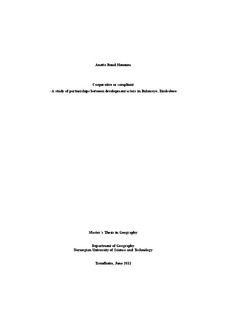| dc.contributor.advisor | Brun, Cathrine | nb_NO |
| dc.contributor.author | Hennum, Anette Ruud | nb_NO |
| dc.date.accessioned | 2014-12-19T14:26:00Z | |
| dc.date.available | 2014-12-19T14:26:00Z | |
| dc.date.created | 2012-08-01 | nb_NO |
| dc.date.issued | 2011 | nb_NO |
| dc.identifier | 542507 | nb_NO |
| dc.identifier.uri | http://hdl.handle.net/11250/265377 | |
| dc.description.abstract | In today’s aid system, “partnership” has become a guiding principle for the desired relationships between actors working with development. By partnering the assumption is that the organisations can be part of a relationship based on mutual accountability and equality, and increase the efficiency in their work.
The purpose of this study was to analyse partnerships and aims to understand how the different organisations understand their role and position, and whether it is possible to achieve an equal partnership in today`s aid system. Theories applied are mainly obtained from theories about scale and power. Relations between partners are also analysed by using a framework that includes dimensions of discourse, interdependence, function and performance.
Qualitative data were collected through interviews and observation during a fieldwork in Bulawayo, Zimbabwe in September and October 2010. 27 interviews were conducted from people representing different organisations; international, national and local and/or community based. Zimbabwe has a complex history and is influenced by political and economical challenges and an oppressed civil society. This has an effect on the work of the development actors operating in the country.
I found that organisations partner and manoeuvre across different geographical scales, and are influenced by the power that exists and are exercised between the partners. How organisations partner and the processes behind initiating projects differ. Organisations have through their explanations on how projects are initiated and the process behind writing proposals, expressed some of the challenges behind choosing type of project, who should be the recipients, the reports that needs to be written and the criteria that follow in these stages. The understanding of these criteria and concepts used, are understood differently among the actors, and influence the implementation of a project. The challenge with flow of information between the actors also becomes evident in Zimbabwe that is trapped between the basic need of the people and the development agenda. The small community based organisations are underestimating the power they have. | nb_NO |
| dc.language | eng | nb_NO |
| dc.publisher | Norges teknisk-naturvitenskapelige universitet, Fakultet for samfunnsvitenskap og teknologiledelse, Geografisk institutt | nb_NO |
| dc.title | Cooperative or complaint: A study of partnerships between development actors in Bulawayo, Zimbabwe | nb_NO |
| dc.type | Master thesis | nb_NO |
| dc.contributor.department | Norges teknisk-naturvitenskapelige universitet, Fakultet for samfunnsvitenskap og teknologiledelse, Geografisk institutt | nb_NO |
